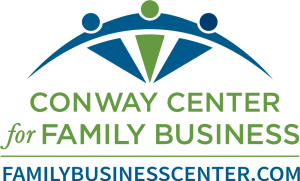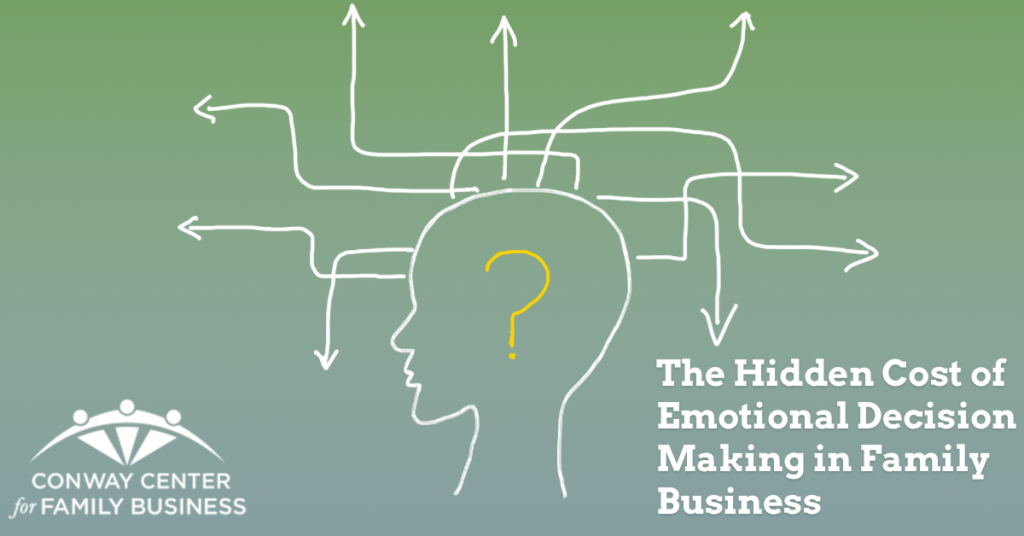Whether it’s promoting a child who’s not ready, avoiding tough conversations with a sibling, or resisting outside advice to ‘keep peace,’ emotional decision-making often drives critical decisions that should be based on logic, strategy, or data. Many family businesses find themselves struggling through the decision-making process due to various emotional factors at play. Emotional decision-making is especially common in family businesses due to the close relationships involved. However, the impact on growth and continuity cannot be overstated. Intentional effort needs to be focused on what your family business can do to create healthier, more objective leadership practices.
What Is Emotional Decision-Making?
Emotional decision-making occurs when choices are based more on emotions like fear, guilt, pride, or loyalty rather than business facts. It can show up in all kinds of places within the family business. From hiring or retaining a family member despite concerns to letting tradition guide financial decisions, emotions can obscure essential choices and lead to a lack of direction. Unresolved family conflicts or dynamics can be detrimental when left unresolved and allowed to control the future of the business.
To be clear, there should be no shame in having emotional investment in your business. Having strong feelings can help drive commitment and result in no decision being taken lightly. The problem arises when emotion dominates logic, and all decisions become more about interfamily relationships rather than the future of the business as a whole.
Why It’s a Bigger Risk in Family Businesses
Unlike non-family firms, where roles are defined and relationships are purely professional, family businesses are layered with personal history. Family dynamics can bleed into professional ones. Don’t dismiss valuable ideas due to prior notions of a family member or allow prior conflicts to influence professional opinions. These types of boundaries need to be defined to allow for trust to grow and separation of personal feelings and the overall needs of the business.
Similarly, tradition can be a smoking gun within the business. ‘How we’ve always done things’ cannot be treated like a valid excuse for lack of direction or expansion. Change is a powerful tool in business, and having the bravery as a family to make changes can make or break the future. Guilt or obligation can also be a dangerous habit in business decisions. Family leaders may feel pressured to reward loyalty or family ties over merit. ‘Keeping it in the family’ is a slippery slope when you have the needs of an entire business to maintain.
Is Your Family Business Being Run by Emotions?
Here are signs that emotional decision-making may be at play:
- Decisions are delayed to avoid upsetting someone.
- Underperformance is tolerated due to family ties.
- Leadership avoids conflict at all costs.
- Business goals frequently take a back seat to family dynamics.
- There’s resistance to outside advice or professionalization.
Strategies to Balance Emotion with Logic
There are myriad ways to ensure the family business is being prioritized. As a starting point, ensure that the key roles and responsibilities are professionalized. Outline clear expectations and conduct regular performance reviews to ensure the business is performing well. Most importantly, once someone is in a role, trust them to make their own decisions regarding their role and trust their opinion when their area of expertise is affected. To ensure they are a valuable decision maker, hire or promote based on qualifications and merit, not family status. Additionally, business governance should never feel like a burden. Structure is a powerful tool to ensure emotional pitfalls like ‘gut feelings’ can be avoided.
Most importantly, normalize having those difficult conversations. Address the elephants in the room before they get too big to ignore. Equipping your leadership team with the tools to communicate and the trust that they will be heard is the best thing you can do to protect your business. The goal isn’t to eliminate emotion, but to make space for healthy dialogue. Emotion is not the enemy. It’s part of what makes family businesses so powerful. But when emotion goes unchecked, it can blur priorities, stall growth, and even jeopardize succession. The key isn’t to eliminate emotion, but to balance it with structure, objectivity, and accountability. That’s where healthy family businesses thrive.
 Want to learn more? Explore the Conway Center’s rich educational offerings and resources at familybusinesscenter.com
Want to learn more? Explore the Conway Center’s rich educational offerings and resources at familybusinesscenter.com

